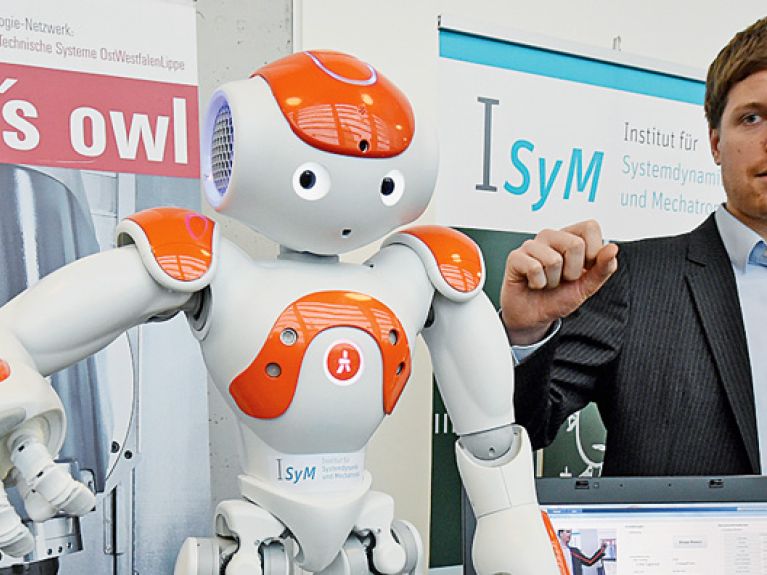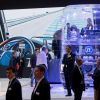Hannover Messe 2016: ready for partner country USA
In 2016 the world’s leading industrial fair welcomes the USA as Partner Country for the first time – and a high-ranking delegation headed by President Barack Obama.

It is not yet clear which robot they are going to bring with them; the researchers at Carnegie Mellon University have several to choose from. There’s the four-legged Chimp, which can climb up ladders and close valves, and the delicate Calliope with its highly sensitive gripper arm. And the tiny Finch, which helps school students to learn programming languages. In any case, stand B60 in Hall 2, the USA’s Technology Pavilion, will be a major attraction at this year’s Hannover Messe.
It is not only Carnegie Mellon that is participating in the world’s most important industrial trade show for the first time; the famous Massachusetts Institute of Technology (MIT) is also exhibiting, alongside more than 200 American companies – the US delegation is the largest ever represented at the fair. The occasion: for the first time the United States is Partner Country of the fair, which is taking place from April 25 to 29. In another first, incumbent US President Barack Obama is to open the fair together with German Federal Chancellor Angela Merkel.
“We have a clear message for the world: the United States is open for business,” says US Secretary of Commerce Penny Pritzker. She expressly encourages US firms to seize the opportunity to take part in the fair: “It is a unique opportunity to showcase our products and our capabilities.” Particularly American SMEs are traditionally viewed as being somewhat focused only on their domestic market. The appeal obviously worked: American firms are set to fill five industrial pavilions; in a sixth the USA is to seek investors.
The event has great symbolic value. While the Chinese economy is faltering and economic relations with Russia are suffering under sanctions, transatlantic trade is on the rise. In fact, in 2015 the USA actually overtook France as Germany’s most important trade partner. According to the German Federal Statistical Office, US-German imports and exports amounted to 173.2 billion euros; France was in second place with 170.1 billion euros. Germany also exported more than twice as much to the USA as the USA exported to Germany.
“The figures show that the USA is becoming ever more important as a sales market and trade partner for German industry with its many SMEs,” comments Stefan Mair, Member of the Executive Board of the Federation of German Industries (BDI).
Supporting free trade
For the USA the role as Partner Country at Hannover Messe also symbolizes the fact that it is revisiting its long-neglected industry. President Obama has been supporting the sector since the financial crisis, for instance by setting up a National Network for Manufacturing Innovation that takes its cue from Germany’s Fraunhofer Society. “The USA has evolved into a highly attractive business partner for industry in the course of its reindustrialization,” confirms Jochen Köckler, Board member of Deutsche Messe AG.
This gives a boost to those who support a free trade agreement, meaning just about everyone in the business world. Precisely the strongly export-oriented German machine and plant manufacturers wish to see technical standardization and the end of duplicate testing. “Analyses showing in particular SMEs suffering only disadvantages because of TTIP and being bowled over by the major corporations give a completely distorted picture”, says Ulrich Ackermann, Head of the Foreign Trade department at the German Engineering Federation (VDMA).
“Integrated Industry – Discover Solutions” is the motto of Hannover Messe 2016. The main themes are networking, sensor technology, robotics, data storage, intelligent energy systems and self-learning machines. In other words, the factory of the future. In Germany the key term encompassing all this is “Industry 4.0”, in the USA people talk of the “Industrial Internet of Things” or “machine to machine”. Over 100 application examples will be on show at Hannover Messe. A special show will also be held on an area that is comparably highly advanced in the practical field, namely predictive maintenance. Here, machines automatically report when maintenance is required; repair services receive error messages via app.
In the age of Industry 4.0 in the business world it has become redundant to distinguish between hardware and software. After all, traditional products are now mini-computers networked among themselves and with the Cloud, be it a milling machine or a workpiece. Conversely software firms are looking for new industrial applications. Germany’s expertise in mechanical engineering and America’s high-tech scene might be a match made in heaven.
In this respect, it is remarkable that the American Industrial Internet Consortium (IIC) is also exhibiting in Hannover. The organization, founded in 2014 by AT&T, Cisco, General Electric, IBM and Intel, negotiates standards in the networked industrial world of tomorrow. Today it has more than 250 member companies from 28 countries, including German firms such as Bosch, SAP and Siemens. In February 2016, the IIC and its German counterpart, the platform Industry 4.0, agreed to formal cooperation. A good sign. ▪

